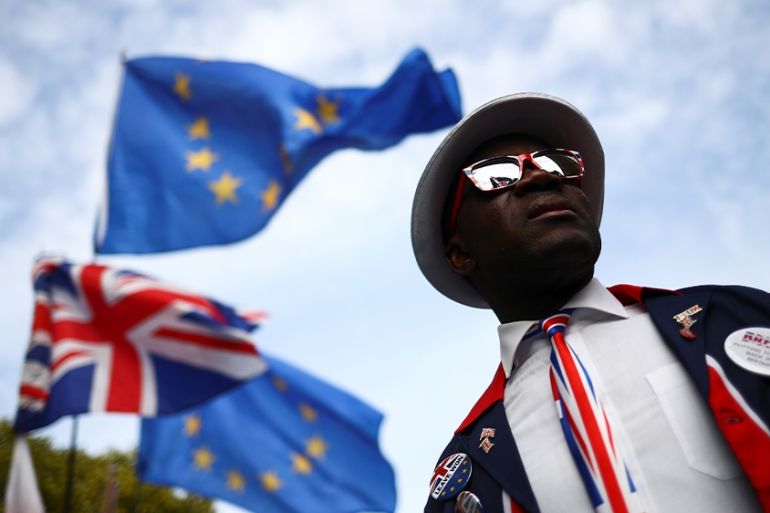‘Brexhaustion’: Voters doubt election will break Brexit impasse
Prime Minister Boris Johnson will try again on Tuesday to trigger general election, in face of weary British electorate.

London, United Kingdom – The United Kingdom’s Brexit saga might not end on October 31, but the plot could be approaching its finale.
Prime Minister Boris Johnson is poised to push his plan for a general election through the UK Parliament again on Tuesday, following his third botched attempt on Monday evening.
Away from Parliament, there appeared to be little faith an election would break the impasse, a feeling perhaps reinforced by “brexhaustion” – Brexit jargon for public fatigue at Parliament’s machinations.
The week in which Johnson had promised to take the country out of the European Union “do or die” opened with yet another Brexit extension, the third in seven months.
EU leaders announced on Monday they were prepared to offer Britain a three-month flexible extension until January 31. The UK could could still leave the bloc before that, should Parliament ratify the withdrawal agreement it voted in favour of, in principle, last week. But opposition parties would attach a barrage of amendments to the bill and the Conservative party would no longer have a working majority in the House of Commons.
On Monday, Johnson failed to secure the backing of a two-thirds super-majority required to win his motion for an election on December 12 under the Fixed-term Parliaments Act (FTPA), with a total of 299 MPs backing the proposal, 70 voting against it and opposition parties abstaining.
Doubts over election
The leader of the opposition, Jeremy Corbyn, has argued a no-deal Brexit must be ruled out completely – including at the end of January – for the party to back an election.
Labour has been lagging behind in the polls.
“We will not allow this paralysis to continue,” the prime minister said as he told MPs he planned to present a one-clause motion to amend the Fixed-Term Parliaments Act and try again to push through his December 12 election bid on Tuesday. This would need only a simple majority to get through.
Two smaller opposition parties, the anti-Brexit Liberal Democrats and the Scottish National Party (SNP) said they would back an election on December 9. The three-day difference would prevent the prime minister from attempting to push the deal through before Parliament is dissolved.
Elections won't achieve anything. Voters are too confused.
“It’s ridiculous, it’s been going on forever and ever and ever,” Margaret Reed, a 65-year-old government employee from Swansea, Wales, told Al Jazeera.
“When we voted, first we didn’t know what we were voting for. And I really think we shouldn’t commit to it, but it looks like we’re going to anyway,” she said, adding that an election would “not really” help break the impasse.
“I will not vote this time, I lost complete faith in the British parliament,” said Sam D’sa, 40, who works as a financial analyst in the city.
“I am a very confused voter myself. This is exactly the reason why elections won’t achieve anything. Voters are too confused.”
While he voted remain in the 2016 referendum, he also thinks that a second referendum would not be democratic.
“What if I don’t like the answer, will I go for a third? If Brexit has to happen with a deal and with the consensus of Parliament, I would live with it.”

Second referendum?
Mark Hendry, a 48-year-old part-time warehouse manager from Essex who voted to “Leave” the UK in 2016, is vehemently opposed to a second referendum.
“This general election to me is like another referendum,” he told Al Jazeera, adding that Boris Johnson “has got to be given the chance. He’s only been prime minister since August.”
Some polls however, suggest that not all Leave voters would let the prime minister get away with breaching his pledge to get Brexit done by October 31 as easily.
A ComRes poll taken on October 16-17 suggested that the Conservative party’s recent poll lead could vanish if Brexit were delayed beyond October 31. It put the party behind Labour with 27 and 26 percent respectively, followed by Nigel Farage’s Brexit Party at 20 percent and the Liberal Democrats at 18.
“What’s going to happen is that the remain vote is going to be split even further with more votes going to the Lib Dems, and we’re going to be in an even worse situation,” said Edward Dodman, a 27-year-old bartender from East London.
“Which means nothing else is going to get done, and that’s why there will be a second referendum.”